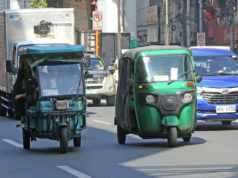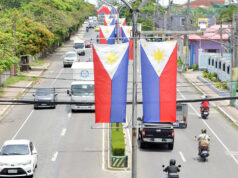Groundwork to improve business conditions not in place as Senate RCEP trade deal approval looms

By Alyssa Nicole O. Tan, Reporter
PHILIPPINE approval of a key regional trade deal could come before the government puts in place the needed groundwork to prepare domestic industries for heightened competition, with agriculture still holding out for safeguards and protections, analysts said.
“The Philippines needs to first get its house in order before plunging itself into the trade partnership,” Victor Andres C. Manhit, president of the Stratbase ADR Institute, said in a text message to BusinessWorld, referring to the Regional Comprehensive Economic Partnership (RCEP) trade deal currently held up in the Senate.
“While there is no argument that being part of the trade deal is theoretically good, much will depend on how the Philippines will position itself,” he added. “If the country has no competitive advantage in trade, it will end up being more of an importer, thus worsening its situation right now.”
Senator Maria Imelda Josefa Remedios R. Marcos, who chairs the Senate’s foreign relations committee, expects RCEP to lead to a surge in imports.
“Let us stop denying that there will be difficulties and sacrifices,” she said during a hearing on RCEP in December. “Of course, this will happen because this will lead to bulk imports.”
She called for “transitional safeguards,” telling the Departments of Agriculture, Environment and Natural Resources, and Trade and Industry, as well as the Bureau of Customs to ensure that preparations are in place by the time the deal is signed.
“At the point of signing, not at some mythical future date,” she said. “We cannot get into an arrangement where we are completely bereft of any skills or powers.”
Mr. Manhit said that the effect of the deal will depend on the current administration’s ability to create an environment conducive to improved productivity.
“The Philippines should be able to stabilize the availability of export commodities and continue to increase its production to cater to the growing demand both from RCEP member and non-member states,” he said.
“Likewise, the Philippines needs to emphasize sustainability, anchored on transparency… social, and governance principles across trade value chains, particularly for export products, as most countries assess them before entering long-term trade partnerships,” he added.
Anthony A. Abad, Trade Advisory Services chief executive officer and Abad Alcantara and Associates senior partner, told BusinessWorld by phone that improving the domestic environment should not be the determining factor in ratifying RCEP.
“The domestic safeguards are things that should have been done even with no RCEP, so if there is a deficit in the number of farm-to-market roads, road systems, or railways that will facilitate the movement of goods, that should have been in place decades ago,” he said.
“If the farmers are having a hard time because of the taxes that they have to pay, then you have to simplify their tax system,” he added. “Don’t burden them. You keep saying that you want us to export, but you burden us with all kinds of rules and bureaucratic requirements. They have to be removed.”
All the elements that go into the cost of doing business, Mr. Abad said, will have to be factored in, citing financing, energy, and the cost of labor, among others.
Meanwhile, Roy S. Kempis, retired Pampanga State Agricultural University professor, said that agriculture “needs to transform from being production-oriented and in many cases subsistence, into agribusiness that adheres to the tenets of entrepreneurship employing outputs of science and technology research.”
More entrepreneurs, he added in a Viber message to BusinessWorld, are needed in the agriculture industry.
He said that currently, agriculture “is not ready to compete in the world market.”
Federation of Free Farmers National Manager Raul Q. Montemayor said that the Philippines has lagged in making its agricultural sector productive and competitive, even as competitors have surpassed it in terms of reliability, quality, and pricing.
“This is precisely the problem with RCEP,” he told BusinessWorld in a Viber message. “It will take a comprehensive assessment of our strengths and weaknesses and a reformulation of our production, processing, and marketing strategies to make our agriculture sector productive and competitive, not only for the export market but more importantly for our economy.”
“The government will have to commit to the necessary investments and sustain its support for extended periods,” he added.
The current situation, Mr. Abad said, highlights the long-running neglect of the agricultural sector, but “RCEP is the one that will provide us the impetus, force us to reform, and plug us into the digital world and the legal world.”
He said, however, that farmers should be considered assets in the export effort rather than “welfare cases.”
“We tend to look at agriculture as hopelessly stuck in 18th or 19th century technology. That’s unacceptable. Even if there were no RCEP, somebody must be doing something to make our agriculture 21st century,” he said.
“If it’s not being done, then there’s something wrong with our governance, in our prioritization,” he added. “Whatever it is, the RCEP creates the market for us to supply the goods and services, and the things that are being touted or being claimed to be the domestic safeguards are actually the things that should have been done decades ago, so that our agricultural sector will not be so backward and so poor.”
Samahang Industriya ng Agrikultura Executive Director Jayson H. Cainglet told BusinessWorld via Viber that the Philippines can only compete if it learns from the experience of larger economies.
“We (need to) follow what the big economies did before opening up their local markets,” he said.
Asian Institute of Management Economist John Paolo R. Rivera, in a Viber message, said that the Philippines should strive towards “good governance, accountability, and total quality management,” calling them keys to becoming a preferred market for RCEP.
The RCEP started taking effect in the various jurisdictions on Jan. 1. Participants include the 10 members of the Association of Southeast Asian Nations, Australia, China, Japan, South Korea, and New Zealand.
The Philippines and Myanmar are the only remaining countries that have yet to formalize their participation in RCEP.
Ms. Marcos has established a technical working group to complete a committee report on RCEP ratification. The committee expects to report it out to plenary once sessions resume on Jan. 23.



